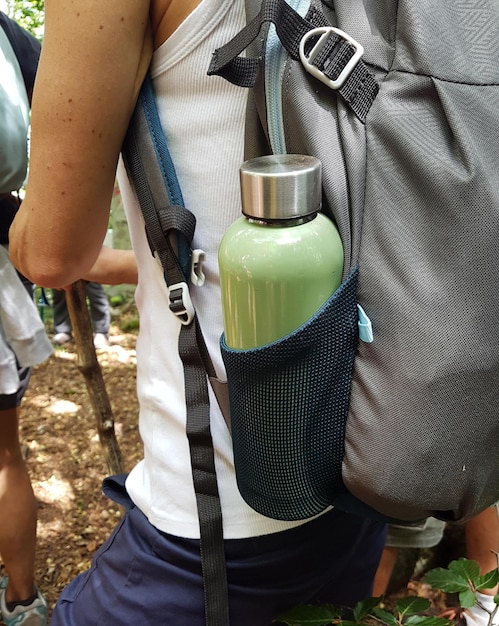Reduce Waste While Traveling in the US: 5 Innovative Ways

Beyond Recycling: 5 Innovative Ways to Reduce Waste While Traveling in the US highlights practical, eco-conscious strategies for minimizing environmental impact during travels within the United States of America, focusing on reusable items, sustainable transportation, supporting local businesses, and mindful consumption.
Are you passionate about traveling but concerned about the environmental impact? Discover Beyond Recycling: 5 Innovative Ways to Reduce Waste While Traveling in the US, ensuring your adventures are both memorable and eco-friendly.
Embrace Reusable Travel Essentials
Reducing waste starts with preparation. By packing reusable items, travelers can significantly decrease their reliance on single-use plastics and other disposable products.
Here are some essential reusable items to consider:
Water Bottles and Coffee Cups
Staying hydrated is crucial during travel, but purchasing bottled water contributes to plastic waste. Similarly, disposable coffee cups add up quickly. Investing in a reusable water bottle and coffee cup helps minimize this impact.
Cutlery and Food Containers
Whether you’re picnicking in a national park or enjoying takeout, carrying your own cutlery and food containers reduces the need for disposable options. Bamboo cutlery sets are lightweight and eco-friendly.

- Benefits of Reusable Water Bottles: Reduces plastic waste and ensures you always have access to safe, clean drinking water.
- Eco-Friendly Coffee Cups: Choose from materials like bamboo, stainless steel, or glass to enjoy your favorite beverages without contributing to waste.
- Versatile Cutlery Sets: Opt for a compact and lightweight set that includes a fork, spoon, knife, and chopsticks, perfect for any meal on the go.
- Reusable Food Containers: Ideal for storing snacks, leftovers, or meals, helping you avoid single-use plastic containers.
By embracing reusable essentials, travelers can take a significant step towards reducing waste and promoting sustainable travel practices.
Opt for Sustainable Transportation
The way you travel can have a substantial impact on your carbon footprint. Choosing sustainable transportation options helps reduce emissions and supports a healthier environment.
Consider these alternatives:
Public Transportation
Utilizing buses, trains, and subways is an excellent way to reduce your carbon footprint compared to driving alone. Many US cities have extensive public transportation networks that make it easy to explore without a car.
Biking and Walking
For shorter distances, biking or walking is a fantastic way to see the sights while minimizing environmental impact. Many cities offer bike-sharing programs and pedestrian-friendly zones.
Electric or Hybrid Vehicles
If driving is necessary, consider renting an electric or hybrid vehicle. These cars produce fewer emissions than traditional gasoline-powered vehicles, making them a more sustainable choice.
- Explore Local Transit: Research local bus and train routes to navigate cities efficiently and reduce your carbon footprint.
- Join Bike-Sharing Programs: Take advantage of bike-sharing programs in cities like New York, Chicago, and San Francisco for eco-friendly exploration.
- Rent Electric Vehicles: Check out rental agencies that offer electric cars to minimize emissions during your road trips.
Choosing sustainable transportation options is a vital component of responsible travel, helping to preserve the environment for future generations.
Support Local and Sustainable Businesses
Where you spend your money matters. Supporting local and sustainable businesses ensures that your travel dollars contribute to the well-being of communities and the environment.
Ways to support sustainable businesses:
Farm-to-Table Restaurants
Dine at restaurants that source ingredients from local farms. These establishments often prioritize sustainable practices and offer fresh, seasonal dishes.
Eco-Friendly Accommodations
Choose hotels and guesthouses committed to sustainability. Look for certifications like LEED or Green Seal, which indicate a commitment to environmental responsibility.

Local Artisans and Shops
Purchase souvenirs from local artisans and shops that prioritize fair labor practices and use sustainable materials. This supports local economies and reduces the demand for mass-produced items.
- Discover Local Markets: Visit farmers’ markets and craft fairs to find unique, locally-made products and support small businesses.
- Check for Green Certifications: Look for accommodations with certifications like LEED or Green Seal to ensure they meet high sustainability standards.
- Ask About Sourcing: Inquire about the sourcing of ingredients and materials at restaurants and shops to support those committed to sustainability.
Supporting local and sustainable businesses not only reduces waste but also enriches your travel experience by connecting you with the community.
Practice Mindful Consumption
Being mindful of your consumption habits while traveling can significantly reduce waste. This involves making conscious decisions about what you buy and how you dispose of items.
Here are some tips for mindful consumption:
Refuse Single-Use Items
Politely decline single-use items like plastic straws, utensils, and shopping bags. Carry your own alternatives to avoid contributing to waste.
Reduce Packaging
Choose products with minimal packaging. Opt for bulk items or products packaged in recyclable or compostable materials.
Proper Waste Disposal
Dispose of waste responsibly by utilizing recycling bins and composting facilities when available. If these options are not available, pack out your trash and dispose of it properly later.
- Say No to Straws: Carry a reusable straw made of stainless steel, bamboo, or glass to avoid single-use plastic straws.
- Choose Minimal Packaging: Opt for products packaged in recyclable or compostable materials to reduce waste.
- Utilize Recycling Programs: Familiarize yourself with local recycling programs and dispose of waste responsibly.
Practicing mindful consumption helps reduce waste and promotes a culture of sustainability while traveling.
Reduce Food Waste
Food waste is a significant environmental issue, and travelers can play a role in reducing it by being mindful of their food choices and habits.
Strategies to minimize food waste:
Plan Your Meals
Avoid over-ordering at restaurants by planning your meals in advance. Use leftovers creatively or share them with others.
Compost Food Scraps
If your accommodation offers composting facilities, use them to dispose of food scraps. This reduces landfill waste and creates valuable compost.
Donate Unwanted Food
If you have excess food that you won’t consume, consider donating it to local food banks or shelters. Many organizations accept non-perishable items and prepared food.
- Order Wisely: Avoid over-ordering at restaurants and plan your meals to reduce food waste.
- Compost Food Scraps: Utilize composting facilities to dispose of food scraps and reduce landfill waste.
- Donate Excess Food: Donate non-perishable items and prepared food to local food banks and shelters.
Reducing food waste not only minimizes environmental impact but also promotes responsible resource management while traveling.
| Key Point | Brief Description |
|---|---|
| 💧 Reusable Bottles | Avoid single-use plastic by carrying your own water bottle. |
| 🚲 Sustainable Transport | Use public transport, bikes, or electric vehicles to reduce emissions. |
| 🛍️ Local Shopping | Support local artisans and businesses for fair practices. |
| 🍽️ Reduce Food Waste | Plan meals, compost scraps, and donate excess food to minimize waste. |
Frequently Asked Questions
▼
Essential reusable items include water bottles, coffee cups, cutlery sets, food containers, and shopping bags. These items replace single-use plastics and reduce waste significantly.
▼
Opt for sustainable transportation options like public transport, biking, walking, or renting electric vehicles. These choices minimize emissions compared to driving alone.
▼
Supporting local businesses ensures that your travel dollars contribute to the well-being of communities and the environment while promoting fair labor practices and sustainable materials.
▼
Practice mindful consumption by refusing single-use items, choosing products with minimal packaging, and disposing of waste responsibly using recycling bins and composting facilities.
▼
Reduce food waste by planning meals, avoiding over-ordering, composting food scraps when available, and donating unwanted food to local food banks or shelters.
Conclusion
By adopting these innovative strategies, travelers can significantly reduce their waste while exploring the United States. Embracing reusable essentials, sustainable transportation, supporting local businesses, practicing mindful consumption, and reducing food waste are all effective ways to ensure your travels are both enjoyable and environmentally responsible, contributing to a more sustainable future for generations to come.





